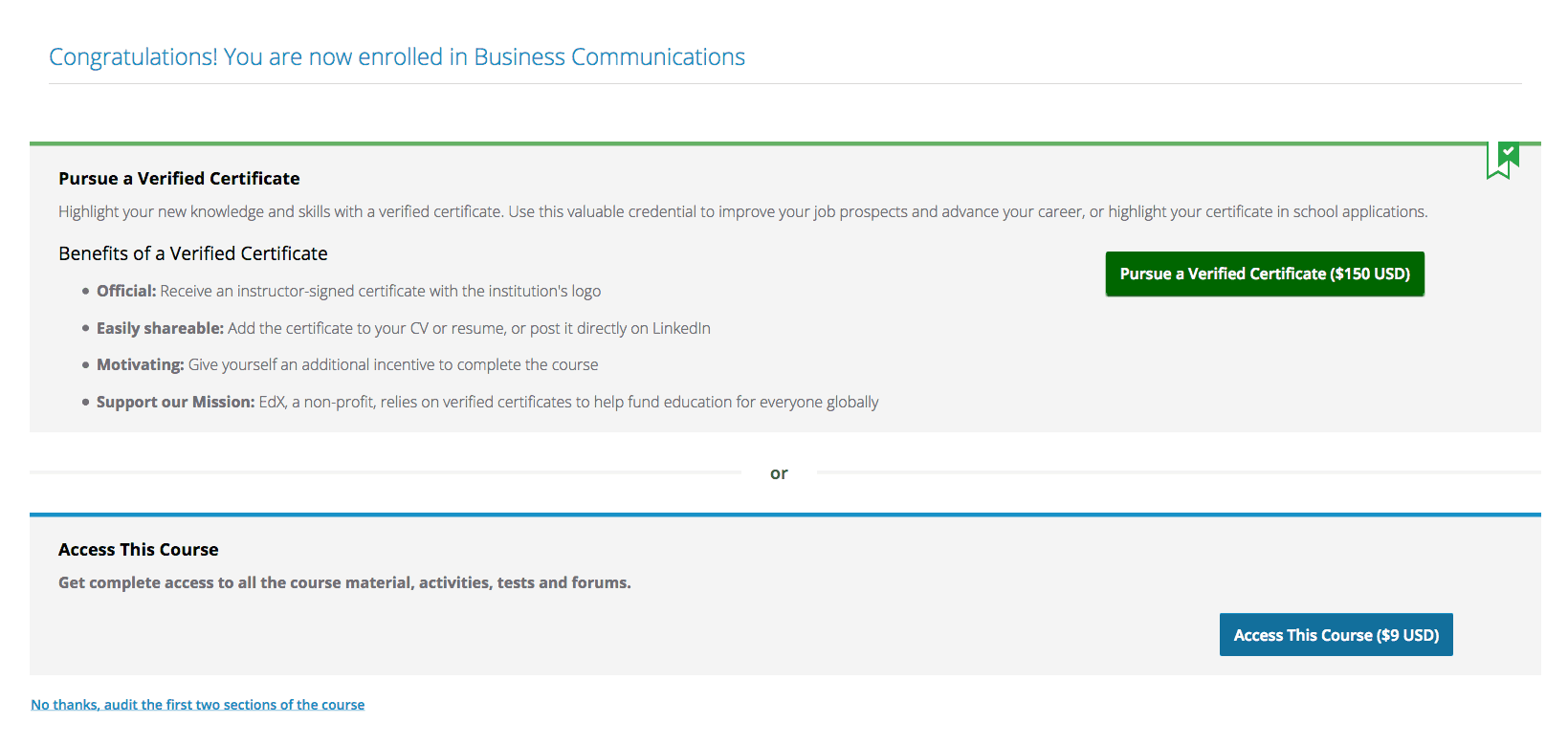First Look at edX’s Paywall Experiments
Class Central came across a few variations of edX’s paywall tests and cataloged it here.
In May edX, the second largest MOOC provider, announced that would move away from offering all its content virtually for free and would begin testing a support fee. This change represents a bid to achieve financial sustainability, for both the platform and its partners. In preparation for this change, edX removed the word “free” from the homepage.
EdX's removes the word "free" from their re-designed homepage
Recently they announced they will start charging a support fee: https://t.co/txn6kxeIUP pic.twitter.com/Lv2A3ohvXf
— Dhawal Shah (@dhawalhshah) May 17, 2018
When edX first announced these changes, I speculated that the platform might run a number of tests to evaluate different payment options. In our own research, Class Central came across a few variations of these tests. To be clear, these tests are not shown to everyone. Usually, only a small percentage of learners are shown any one of these tests.
Prior to the changes in fee structure, most edX courses offered two pricing tiers:
- Audit the course for free.
- Pay for a Verified Certificate.
Test 1: $9 access fee

In this test, there are three pricing tiers
- Audit for free (limited in this test only to two weeks).
- Pay $9 for access to all the course materials.
- Pay the standard price for a Verified Certificate.
An example of this test I came across was the Business Communications course from The University of British Columbia.
Test 2: Completely Paid Courses

In this test, there is just one tier: the entire course materials and certificate are behind a single paywall. The two courses that I came across that were under these tests were Introduction to Accounting from The University of British Columbia and, Animation and CGI Motion from Columbia University.
Test 3: Time Limit

In the last test we came across, free access ends after a certain period of time. This is somewhat similar to FutureLearn’s pricing model. This test was sent in by Pat Bowden of Online Learning Success. Thanks Pat!
If you come across more tests, do let us know in the comments.
Tags







Eric Kemosabe Hrahsel
Its Kinda unfair. Education need to be free. This is the reaskn why i couldn’t join a college, and now they do this again.
Blob Harvey
I think $9 is affordable. $1700 for a single college class is a significant barrier. I do hope they make the course materials searchable and accessible for free after the course is over.
James Sawyer
I think it is reasonable to pay a small amount for a course and $9 should not be prohibitive. I have audited some courses and have sent a donation to edX for these. Another option could be to request a donation to help make this excellent program sustainable and available at no charge to emerging countries.
Kon
And this is how MOOCs have turned from “education for all” to “making money for the providers”. For Udacity & Coursera this was all expected, for supposed non-profit EdX just depressing. And all that with MIT & Co in the background with billion in endowments.
I guess the key incentive for ‘free’ is gone. They can still claim x million user numbers – based on the old signups.
Bill Seliger
The development of education materials and the costs of running the classes needs to be a sustainable business (or it won’t sustain itself). I love the free option because it allows for a lot of ‘grazing’ and I think closing the door on that is not a good thing for MOOC platforms. My guess is that, if the universities that are running MOOCs attributed the true cost of running them to the MOOC they’d be big money losers (things like faculty time and graduate assistant time).
Luis P.
It is pretty unreasonable to expect all content to be free. Another comment above mentions that this was a reason not to join college, but the fees charged here are nothing compared to tuition fees in an actual college. Education can be free for sure, go to a library and get a book.
Bharat Y Pathakjee
Hi
As a retired Physician I enjoy learning for the sake of learning – I do not need a Certificate , I understand the cost and time factor issue. I would not be opposed to pay small access fee. Time limit is a hindrance. Once allowed access I have gone back even three years later and listened to the Lectures just as a refresher , I am hardly likely to sell the material or violate copyright. Thank you
Bob Sheff
I believe education should be free, only costing the time and concentration to succeed. The cost of education should be born by society and the consumers of educated people: Businesses needing trained employees. This could be accomplished by providing subscriptions or access to lists of students with pertinent educational accomplishments. Further, the initial hiring of a student should be worth a fee commiserate to the cost of educating the employee. Potential students might find value in the lists of businesses and their desired fields, and how much they are willing to spend!
Dr. Lou Tharp
To quote President Reagan, “There is no free lunch.” If a student is not willing to commit to $9, it demonstrates that they are not motivated enough to be pursuing their own education. On the other hand, I think that MOOCs need to move on to a realistic system of accreditation. Beef up existing MOOCs and then initiate a serious monitored examination system. The examination system of Oxford University has worked well for centuries. Actually, if the incredible rise of grade inflation continues, grades will mean nothing anyway. When I attended Yale in the 1960’s getting a grade above 90 was fairly rare. As best I remember, I ended with a grade average of 89 and graduated magna cum laude, which was top 5% of class. From what I hear today’s grade distribution is very different. Let students take universal objective exams and give them prove that their MOOC education is worth of college credit. If not, then they still gained the knowledge that they received, which should be a reward of its own.
An almost free MOOC education AVAILABLE TO ALL is the future of the 21st century.
Michael Moore
Subscription fee to access all classes should be an option. Otherwise, just like college, some might be throwing money away by taking classes they find out they are not prepared for or are not interested in. Or if they drop it within a certain amount of time, say
28 or 30 days, they are eligible for a refund. So 2 options. Subscription fee, or “full time” status, 30 dollars a semester, or perhaps 6 to 8 classes or something, or individually at 9 dollars a piece, with the ability to ask for a refund within 28 days if they find the class does not suit them for whatever reason. You have to think that probably like myself, many people are drawn here because they want to explore topics they either missed or have never had a chance to explore, and they very find those topics might not suit them or require prerequisites they are missing.
Ajay
They should make the course content free but charge a small amount of say 9$ in the form of ‘exam fee’. This should be fine with most students.
hgerechter
A few days ago, I discovered that the course I’m currently taking isn’t visible through the Android mobile app.
When I wrote to ask edX support they responded (promptly, I should say) that ” [u]nfortunately, certain courses are only accessible to verified users in the mobile app. ” Access through PC browser still works, though.
So another, somewhat annoying, monetization experiment…